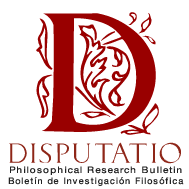Sharon Rider
Uppsala University, Sweden | sharon.rider@filosofi.uu.se
Received: 18-November-2019 | Accepted: 21-December-2019 | Published: 27-December-2019
Disputatio [Dec. 2019], Vol. 8, No. 11, pp. 000–000 | DOI: 10.5281/zenodo.3635218
Article | [SP] | Full Text | Statistics | Copyright Notice [sp] | Vol. 8 No. 11
How to cite this article:
Rider, Sharon (2019). «Modal Power, Self-Conscious Science, and the Critique of Epistemic Paternalism, or How to Change your Mind: An Interview with Steve Fuller». Disputatio. Philosophical Research Bulletin 8, no. 11: pp. 597–615.
Abstract | This interview with Steve Fuller was conducted by e-mail between 3 September and 31 October, 2019, Professor Steve Fuller was sent six detailed, written questions regarding a number of his fundamental concerns as these have been articulated throughout his work. The broad themes covered have to do, inter alia, with his views on philosophy as a discipline, the conditions of scientific progress, the role of traditions in human thinking, and the implications of his position on these and other issues for the future of higher education. The interview consists of the questions together with his written responses. A list of references to published works relevant to Professor Fuller’s answers in the interview is appended.
Keywords | STS · Relativism · Realism · Post-Truth · Expertise · Modal Power.
![]()
Poder modal, ciencia autoconsciente y la crítica del paternalismo epistémico, o cómo cambiar de opinión: una entrevista con Steve Fuller
Resumen | Esta entrevista con Steve Fuller se realizó por correo electrónico entre el 3 de septiembre y el 31 de octubre de 2019, al profesor Steve Fuller se le enviaron seis preguntas detalladas y escritas sobre varias de sus preocupaciones fundamentales, ya que se han articulado a lo largo de su trabajo. Los amplios temas cubiertos tienen que ver, entre otras cosas, con sus puntos de vista sobre la filosofía como disciplina, las condiciones del progreso científico, el papel de las tradiciones en el pensamiento humano y las implicaciones de su posición sobre estos y otros temas para el futuro de la educación superior. educación. La entrevista consta de las preguntas junto con sus respuestas escritas. Se adjunta una lista de referencias a trabajos publicados relevantes para las respuestas del profesor Fuller en la entrevista.
Palabras clave | CTS · Relativismo · Realismo · Post-verdad · Experiencia · Poder modal.
References
Bernays, Edward (1928). Propaganda. New York: Horace Liveright.
Fuller, Steve (2000). The Governance of Science: Ideology and the Future of the Open Society. Milton Keynes UK: Open University Press.
Fuller, Steve (2006). The Philosophy of Science and Technology Studies. London: Routledge.
Fuller, Steve (2013). ‘Deviant interdisciplinarity as philosophical practice: Prolegomena to deep intellectual history’. Synthese 190: pp. 1899-1916.
Fuller, Steve (2016). ‘A sense of epistemic agency fit for social epistemology’. In Social Epistemology and Epistemic Agency, edited by Patrick J. Reider. Lanham MD: Rowman & Littlefield, pp. 21-41.
Fuller, Steve (2018). Post-Truth: Knowledge as a Power Game. London: Anthem.
Fuller, Steve (2019). ‘The metaphysical standing of the human: A future for the history of the human sciences’. History of the Human Sciences 32: pp. 23-40.
Fuller, Steve and James H. Collier (2004). Philosophy, Rhetoric and the End of Knowledge. 2nd ed. (Orig. 1993, by Fuller). Hillsdale NJ: Lawrence Erlbaum Associates.
Fuller, Steve and Veronika Lipinska (2014). The Proactionary Imperative. London: Palgrave Macmillan.
Ripstein, Arthur (2016). Private Wrongs. Cambridge MA: Harvard University Press.
© The author(s) 2019. This work, published by Disputatio [www.disputatio.eu], is an Open Access article distributed under the terms of the Creative Commons License [BY–NC–ND]. The copy, distribution and public communication of this work will be according to the copyright notice. For inquiries and permissions, please email: boletin@disputatio.eu.

